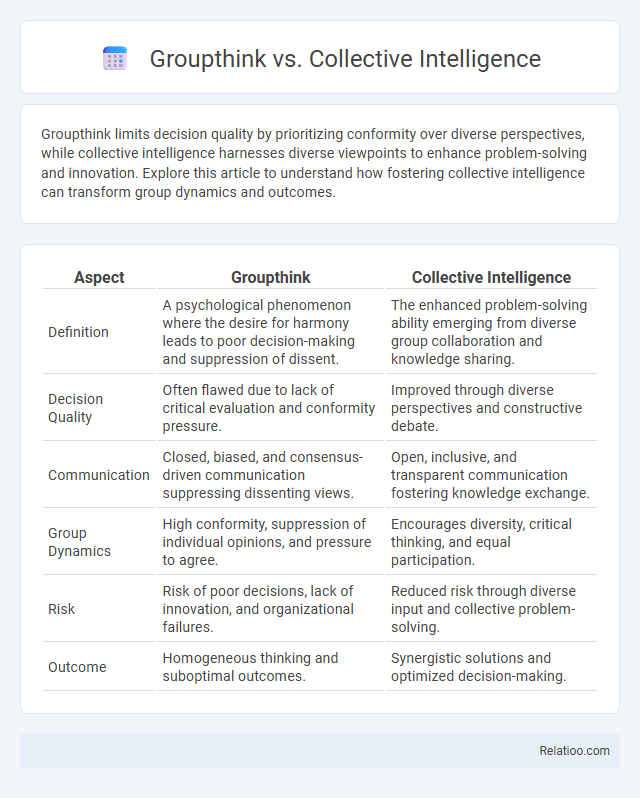Groupthink limits decision quality by prioritizing conformity over diverse perspectives, while collective intelligence harnesses diverse viewpoints to enhance problem-solving and innovation. Explore this article to understand how fostering collective intelligence can transform group dynamics and outcomes.
Table of Comparison
| Aspect | Groupthink | Collective Intelligence |
|---|---|---|
| Definition | A psychological phenomenon where the desire for harmony leads to poor decision-making and suppression of dissent. | The enhanced problem-solving ability emerging from diverse group collaboration and knowledge sharing. |
| Decision Quality | Often flawed due to lack of critical evaluation and conformity pressure. | Improved through diverse perspectives and constructive debate. |
| Communication | Closed, biased, and consensus-driven communication suppressing dissenting views. | Open, inclusive, and transparent communication fostering knowledge exchange. |
| Group Dynamics | High conformity, suppression of individual opinions, and pressure to agree. | Encourages diversity, critical thinking, and equal participation. |
| Risk | Risk of poor decisions, lack of innovation, and organizational failures. | Reduced risk through diverse input and collective problem-solving. |
| Outcome | Homogeneous thinking and suboptimal outcomes. | Synergistic solutions and optimized decision-making. |
Defining Groupthink and Collective Intelligence
Groupthink is a psychological phenomenon where the desire for harmony in a decision-making group leads to irrational or dysfunctional outcomes, often suppressing dissenting opinions to maintain consensus. Collective intelligence refers to the enhanced capacity created when individuals collaborate, share knowledge, and pool their cognitive resources to solve complex problems more effectively than any single member could alone. While groupthink impairs decision quality through conformity pressure, collective intelligence harnesses diverse perspectives to improve problem-solving and innovation.
Key Characteristics of Groupthink
Groupthink is characterized by a strong desire for consensus, leading to suppression of dissenting opinions and poor decision-making outcomes. Unlike Collective Intelligence, which leverages diverse perspectives for optimal solutions, Groupthink prioritizes conformity over critical thinking. Understanding these key characteristics can help your team avoid pitfalls and harness genuine collaboration.
Key Characteristics of Collective Intelligence
Collective intelligence is characterized by the collaborative synergy of group members pooling diverse knowledge, expertise, and perspectives to achieve superior problem-solving and decision-making outcomes. Unlike groupthink, which often suppresses dissent and encourages conformity leading to poor decisions, collective intelligence thrives on open communication, critical evaluation, and integration of independent judgments. Key features include decentralized decision-making, distributed cognition, and the dynamic aggregation of insights, enabling more innovative and effective group solutions.
Causes and Triggers of Groupthink
Groupthink arises from strong group cohesion, directive leadership, and high stress, which suppress dissent and critical thinking, leading to poor decision-making. Causes include isolation from external opinions, homogeneity of group members, and a desire for unanimity that discourages conflicting viewpoints. Your awareness of these triggers can help prevent the pitfalls of groupthink, promoting more effective collective intelligence through diverse perspectives and open dialogue.
Factors That Foster Collective Intelligence
Factors that foster collective intelligence include diversity of skills, open communication, and an environment that encourages critical thinking and the free exchange of ideas. Unlike groupthink, which suppresses dissent in favor of unanimity, collective intelligence thrives when group members challenge assumptions and incorporate a wide range of perspectives. By facilitating trust and mutual respect, your team can harness collective intelligence to make better decisions and solve complex problems.
Groupthink: Risks and Negative Impacts
Groupthink occurs when the desire for conformity in a group leads to poor decision-making, suppressing dissenting opinions and critical thinking. This phenomenon increases the risk of flawed policies, overlooking alternative solutions, and escalating errors, which can severely impact team performance and organizational outcomes. Understanding Groupthink helps you identify warning signs and implement strategies to encourage diverse perspectives and improve collective intelligence.
Collective Intelligence: Benefits and Advantages
Collective intelligence harnesses the diverse knowledge, skills, and perspectives of a group to solve complex problems more effectively than individuals working alone. This approach enhances decision-making quality, fosters innovation, and increases adaptability by leveraging distributed expertise and collaborative synergy. Unlike groupthink, which limits critical evaluation and promotes conformity, collective intelligence encourages open dialogue and critical thinking, resulting in better outcomes for organizations and teams.
Real-World Examples of Groupthink vs Collective Intelligence
Groupthink often leads to poor decision-making in high-stakes environments like the 1986 Challenger disaster, where NASA engineers dismissed warning signs due to conformity pressure. Collective intelligence, in contrast, is demonstrated by crowdsourced platforms like Wikipedia, where diverse input creates accurate and comprehensive knowledge. Your team can avoid the pitfalls of groupthink and foster collective intelligence by encouraging open dialogue and critical evaluation.
Strategies to Prevent Groupthink and Enhance Collective Intelligence
Strategies to prevent groupthink involve promoting open dialogue, encouraging diverse perspectives, and establishing a culture where dissenting opinions are valued to avoid conformity pressures. Enhancing collective intelligence can be achieved by leveraging collaborative tools, fostering inclusive participation, and integrating expertise from varied backgrounds to improve decision-making quality. Implementing structured decision-making processes like the Delphi method and appointing impartial facilitators also helps balance groupthink risks while maximizing collective intelligence benefits.
Comparing Outcomes: Groupthink vs Collective Intelligence
Groupthink often leads to poor decision-making due to conformity pressure, resulting in reduced creativity and overlooked risks. Collective intelligence, by contrast, harnesses diverse perspectives and expertise, enhancing problem-solving and innovation outcomes. Studies show teams employing collective intelligence outperform those plagued by groupthink in accuracy and adaptability.

Infographic: Groupthink vs Collective Intelligence
 relatioo.com
relatioo.com